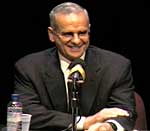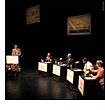Four Candidates, Few Differences
By Bob Collins
September 11, 2000
Part of MPR's coverage of Campaign 2000
The candidates for the DFL nomination for U.S. Senate squared off in the final debate of the primary election season Sunday night in Saint Paul. But their efforts to separate themselves from each other failed, as the debate revealed more about what they have in common.
RECENT POLLS HAVE SUGGESTED that Mark Dayton is the front-runner in this race, and apparently the candidates have taken the surveys to heart. Most of the DFLers focused on Dayton at the beginning of the two-hour debate. However, they were unable to sustain it beyond an opening salvo over national health care policy.
Dayton, who has advocated a national health-care plan that could combine employer mandates and spread the cost among employers, government and citizens, came in for the strongest criticism from Mike Ciresi, who said Dayton's plan would "bankrupt small businesses." Ciresi repeatedly asked Dayton to put a price-tag on his plan.
"What's the cost of not providing it?" responded Dayton.
Dayton has made health care the key part of his campaign for office, even sponsoring bus trips for seniors to Canada, where prescription drug prices are lower. Last week it was revealed that Dayton held $500,000 worth of stock in one drug company. He has since ordered his financial advisers to sell the stock.
Each of the candidates criticized the Republican approach to solving high prescription drug prices. The GOP plan would offer federal subsidies to private insurance companies to cover prescription drug costs for low-income senior citizens and seniors with high drug costs.
"The Republican approach is in the wrong direction. You would subsidize the insurance companies and expect them to do the right thing," said Yanisch. "We've seen what happens; 900,000 people were dropped from Medicare coverage this summer, so how can we expect the insurance companies to do what's best?"
Ciresi suggested he would change the plan through negotiation, rather than a blanket rejection of the GOP plan. He said he would allow seniors to import a drug from another country if it were FDA-approved, and ban drug companies from advertising. Overall, he called the Republican plan "unworkable."
Dayton said Republicans would give better coverage to the "relatively better off." He said insurance and drug companies were gouging senior citizens and said the government was doing nothing about it because the Republicans control Congress.
While the disagreement over national health care sparked early disagreement among the candidates, it was short-lived. On most of the issues covered, the DFLers did little to distinguish themselves from one another.
Each of the candidates devoted generous amounts of time to education, an issue that regularly appears in polls as the most important issue for Minnesotans. But that issue, too, failed to expose wide disagreement among the candidates. Most took the opportunity to voice support for public education.
"We're making public schools the scapegoat of our society and we ought to stop right now," said Dayton. He said the country should "fully fund Head Start," and expand other early-childhood programs.
Janezich noted that Gov. Jesse Ventura called for the state to take over funding for schools. "That's a heck of a discussion we should engage ourselves in," said Janezich. But he did not indicate whether he supports Ventura's position.
On every foreign policy question raised, the candidates agreed. Each proposed ending economic sanctions against Iraq.
"We are the most powerful nation in the world," said Ciresi, "and we ought to be able to take the first step in easing the sanctions for a period of time. If they respond, then we are moving down the road to negotiation."
"I support lifting the embargo on food, medicine, and humanitarian products with Iraq," said Dayton. He also said sanctions against Cuba should also be lifted.
"The greatest country in the world should not use food and medicine as a weapon," said Janezich.
Rebecca Yanisch said she supports easing sanctions, citing lessons from her father, when she was growing up on a farm. "It wasn't a discussion about feeding the friends of the United States," she said, "it was talk about feeding the world."
On other issues, the debate was a gathering of like minds. Each opposed student-led prayer in public schools, opposed the free trade agreement with China, supported the Vento-Oberstar agreement which allowed some motorized portages in the Boundary Waters Canoe Area Wilderness, and suggested a "go-slow" approach to expanding NATO.
Three of the four candidates are millionaires. And the question of campaign reform sparked a small debate between Ciresi and Janezich. Janezich has complained that his opponents have outspent him, thanks to their personal fortunes.
But while agreeing with the concept of campaign reform, Ciresi was having none of Janezich's criticism.
"Franklin Roosevelt did more for the poor in this country and he had inherited wealth," Ciresi said. "We have to get away from what financial success people have had and talk about the content of their character."
"I'm not saying the wealthy shouldn't be allowed to run for office," Janezich retorted. "I'm saying the poor should be able to."
Many of those at the Fitzgerald Theater had good reason to expect a more intense debate. On Friday night, the four engaged in the most spirited debate of the campaign, spurred on by a last-minute flurry of TV ads. But after two-hours of debate Sunday night, none of the candidates appeared to have scored, or suffered, any direct hits.
By Bob Collins
September 11, 2000
Part of MPR's coverage of Campaign 2000
The candidates for the DFL nomination for U.S. Senate squared off in the final debate of the primary election season Sunday night in Saint Paul. But their efforts to separate themselves from each other failed, as the debate revealed more about what they have in common.
| |
|
|
|
||
Dayton, who has advocated a national health-care plan that could combine employer mandates and spread the cost among employers, government and citizens, came in for the strongest criticism from Mike Ciresi, who said Dayton's plan would "bankrupt small businesses." Ciresi repeatedly asked Dayton to put a price-tag on his plan.
"What's the cost of not providing it?" responded Dayton.
Dayton has made health care the key part of his campaign for office, even sponsoring bus trips for seniors to Canada, where prescription drug prices are lower. Last week it was revealed that Dayton held $500,000 worth of stock in one drug company. He has since ordered his financial advisers to sell the stock.
Each of the candidates criticized the Republican approach to solving high prescription drug prices. The GOP plan would offer federal subsidies to private insurance companies to cover prescription drug costs for low-income senior citizens and seniors with high drug costs.
"The Republican approach is in the wrong direction. You would subsidize the insurance companies and expect them to do the right thing," said Yanisch. "We've seen what happens; 900,000 people were dropped from Medicare coverage this summer, so how can we expect the insurance companies to do what's best?"
| |
|
|
|
||
Dayton said Republicans would give better coverage to the "relatively better off." He said insurance and drug companies were gouging senior citizens and said the government was doing nothing about it because the Republicans control Congress.
While the disagreement over national health care sparked early disagreement among the candidates, it was short-lived. On most of the issues covered, the DFLers did little to distinguish themselves from one another.
Each of the candidates devoted generous amounts of time to education, an issue that regularly appears in polls as the most important issue for Minnesotans. But that issue, too, failed to expose wide disagreement among the candidates. Most took the opportunity to voice support for public education.
"We're making public schools the scapegoat of our society and we ought to stop right now," said Dayton. He said the country should "fully fund Head Start," and expand other early-childhood programs.
Janezich noted that Gov. Jesse Ventura called for the state to take over funding for schools. "That's a heck of a discussion we should engage ourselves in," said Janezich. But he did not indicate whether he supports Ventura's position.
On every foreign policy question raised, the candidates agreed. Each proposed ending economic sanctions against Iraq.
"We are the most powerful nation in the world," said Ciresi, "and we ought to be able to take the first step in easing the sanctions for a period of time. If they respond, then we are moving down the road to negotiation."
"I support lifting the embargo on food, medicine, and humanitarian products with Iraq," said Dayton. He also said sanctions against Cuba should also be lifted.
"The greatest country in the world should not use food and medicine as a weapon," said Janezich.
Rebecca Yanisch said she supports easing sanctions, citing lessons from her father, when she was growing up on a farm. "It wasn't a discussion about feeding the friends of the United States," she said, "it was talk about feeding the world."
| |
|
|
|
||
Three of the four candidates are millionaires. And the question of campaign reform sparked a small debate between Ciresi and Janezich. Janezich has complained that his opponents have outspent him, thanks to their personal fortunes.
But while agreeing with the concept of campaign reform, Ciresi was having none of Janezich's criticism.
"Franklin Roosevelt did more for the poor in this country and he had inherited wealth," Ciresi said. "We have to get away from what financial success people have had and talk about the content of their character."
"I'm not saying the wealthy shouldn't be allowed to run for office," Janezich retorted. "I'm saying the poor should be able to."
Many of those at the Fitzgerald Theater had good reason to expect a more intense debate. On Friday night, the four engaged in the most spirited debate of the campaign, spurred on by a last-minute flurry of TV ads. But after two-hours of debate Sunday night, none of the candidates appeared to have scored, or suffered, any direct hits.



